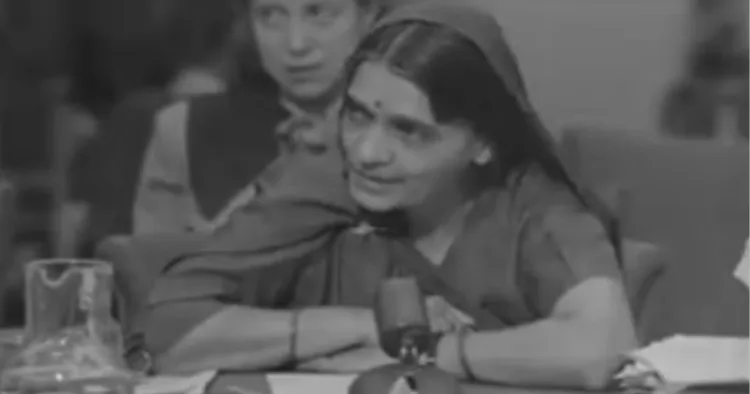Hansa Jivraj Mehta, the daughter of Manubhai Mehta, the Dewan of Baroda state, her education-in Baroda university, and London, and her list of accomplishments would have been out of place in any other period of Indian history.
She was also first woman vice chancellor in India with her 2-year term at the SNDT university in Bombay.
Internationally she had served as a member of the United Nations sub-committee on the status of women, and vice chair, with Eleanor Roosevelt on the United Nations Universal Declaration of Human Rights committee.
Hansa Mehta served in the constituent assembly from 1946-1949. She was a member of the Fundamental rights sub-committee, the advisory committee and the provincial constitutional committee.
On 15th August 1947, a few minutes after midnight, Hansa Mehta on behalf of the ‘women of India’ had the honour of presenting the Indian National Flag to the assembly. This was the first flag to fly over Independent India.
Before her stint in the constituent assembly, Hansa Mehta had made her mark as an educationist, writer, feminist and reformist. As an educator, she fought for continuing education for both boys and girls, set up home sciences as a university subject, and started a post graduate school of social work.
The AIWC during her time, started the Lady Irvin College in New Delhi, a women’s college for home science, educational research and teacher training.
A staunch feminist, Hansa Mehta drafted the Indian Women’s Charter of Rights and Duties during the 18th AIWC session in Hyderabad in 1946. The charter demanded that women be treated as equal to men, and be given the civic rights, education, health on par with the men. The charter also called for equal pay, equal distribution of property, and equal application of marriage laws. The charter went above and beyond its intended audience, when the United Nations Declaration of Human Rights adopted the ideas into its document.
As a reformist, Hansa Mehta played an integral role as a part of a strong women’s movement that pushed for abolition of child marriage (Sarada Act), abolition of the devdasi system, insistence of better educational opportunities for women and in personal law reforms.
With Rajkumari Amrit Kaur she framed the famed Indian Women’s Charter of Rights and Duties and fought for the Uniform Civil Code;
And with Vijaylakshmi Pandit she worked on women’s equality and human rights in the UN.
Hansa Mehta’s most significant contribution to the constituent assembly debates was in trying to make the Uniform Civil Code (UCC) a justiciable part of the constitution. As part of the fundamental rights sub committee, she along with Rajkumari Amrit Kaur, Ambedkar and Manoo Masani saw the UCC as part of the ‘state’s responsibility” to establish a single Indian identity over multiple religious identities.
Hansa Mehta’s speeches in the assembly reflect her deeply held conviction that equality across the board for all humans was the surest way to ensure justice for all.
She was dismissive of the idea of privileges, and concurred that they were not in the spirit of democracy.
Her reflections on the constitution in a speech given on 22nd November 1949 pointed out that while “nowhere in the Constitution have we defined ‘minorities’”, the constitution has made every effort to ensure that everyone were guaranteed equal protection of law, equality of status, opportunity and religious rights.
She successfully championed her cause changing the phrase in the Universal Declaration of Human Rights, from “All men are born free and equal” to “All human beings are born free and equal.”
She worked indefatigably for education and women’s rights post her UN service. She went on to serve on the board of UNESCO and was awarded the Padma Bhushan in 1959.
The legacy that Hansa Mehta has left behind is a testament to her indefatigable spirit and dedication to the simple idea that all humans should be equal, educated and empowered.
Participation in Debates
11.162.116
Hansa Mehta: In spite of all that and in spite of all the many complicated problems that we had to tackle, I feel that we have not done badly. The most difficult problem that we had to tackle was the problem of Minorities. Nowhere in the Constitution we have defined ‘Minorities’. We accepted the definition that was given to us by the last Rulers. They created religious minorities, communal minorities in order to help their policy of divide and rule and that policy has culminated in the partition of this country. We do not want any more partitions. What do the minorities want? What can be their claims? The Constitution guarantees equal protection of law, equality of status, equality of opportunity; the Constitution guarantees religious rights. What more can the Minorities ask for? If they want privileges, that is not in the spirit of democracy. They cannot ask for privileges. The only exception, however, I would like to make is in the case of the Scheduled Castes. They have suffered and suffered long at the hands of the Hindu society and any exception in their case would be making amends to what they have suffered. In this connection, the abolition of untouchability is the greatest thing that we have done and posterity will be very very proud of this.
Hansa Mehta: The other item to which I wish to draw the attention of the House is the Common civil Code. To my mind this is much more important than even the national language. We have too many personal laws in this country and these personal laws are dividing the nation today. It is therefore very essential if we want to build up one nation to have one Civil Code. It must, however, be remembered that the Civil Code that we wish to have must be on a par with, or in advance of, the most progressive of the personal laws in the country. Otherwise, it will be a retrograde step and it will not be acceptable to all.



















Comments